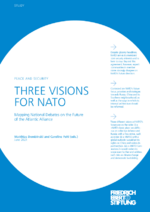The Future of NATO
The transatlantic Alliance has been one of the core security pillars of German and European defense policy for decades. Since the end of the Cold War it underwent a series of internal transformations and reorientations triggered by developments in the international security environment and pressure form its member states.
Crisis Management in the Balkans and eastwards enlargement in the 1990s, anti-terrorism deployments in the 2000s and a reorientation towards Alliance defense and deterrence since 2014. It’s posture and development will remain a crucial factor in German and European defense policy for the forseeable future. Accordingly FES will closely follow the policy discourse on current and future NATO policy and facilitate social democratic and progressive positions.
Since the start of the Russian invasion of Ukraine in 2022, and now with the change of US administration in early 2025, the future of NATO has had to be fundamentally rethought. The debates on NATO have changed worldwide. The Friedrich-Ebert-Stiftung is closely following the political discourse. We are currently working on an updated study of the various debates on NATO and will publish it here before the NATO Summit on 24 June 2025.
Contact
Study 2025
Launch June 2025
Study 2021
Three visions for NATO
Berlin, 2021
Download (PDF) (1,5 MB PDF-File)
Those periods when the Alliance reviews its strategic orientation are of particular importance. Right now, in June 2021 NATO is embarking on a process to revise its strategic concept, starting with its first post-Trump summit scheduled to take place in Brussles on June 14th. To engage in the upcoming policy debates in Germany, Europe and the Alliance writ large, it is important to first obtain an overview and understanding of where discussions about the future of the Alliance in different member states (and non-member states) come from and where experts see the Alliance heading towards.
Our new study “Three Visions for NATO - Mapping National Debates on the Future of the Alliance” shall provide experts but also policy makers and interested citizens with the orientation and expertise necessary to effectively engage in the democratic processes shaping the future of the Alliance. The complete study can be accessed as pdf-file (see above), EPUB-file or Kindle Ebook (forthcoming).
Furthermore you can access the individual parts and graphics of the study in separate files below:
Executive Summary
Matthias Dembinski and Caroline Fehl
Three Visions for NATO
Throught the Kaleidoscope: Comparing Visions of NATO
Berlin 2021
Introduction
Matthias Dembinski and Caroline Fehl
Three Visions for NATO
Introduction
Berlin 2021
On the Road to NATO 2030
Matthias Dembinski and Caroline Fehl
Three Visions for NATO
On the Road to NATO 2030: How the Organization Views the Future of NATO
Berlin 2021
The United States Debates the Future of NATO
Caroline Fehl
Three Visions for NATO
The United States Debates the Future of NATO
Berlin 2021
The Canadian Discourse on NATO's Future
Dirk Peters
Three Visions for NATO
The Canadian Discourse on NATO's Future
Berlin 2021
The French Debate on the Future of NATO
Janna Chalmovsky
Three Visions for NATO
The French Debate on the Future of NATO
Berlin 2021
Germany's View on the Future of NATO: Necessary but in Need of Repair
Matthias Dembinski
Three Visions for NATO
Germany's View on the Future of NATO: Necessary but in Need of Repair
Berlin 2021
Italy Debates the Future of NATO
Matthias Dembinski
Three Visions for NATO
Italy Debates the Future of NATO
Berlin 2021
The Netherlands and the Future of NATO
Matthias Dembinski
Three Visions for NATO
The Netherlands and the Future of NATO
Berlin 2021
Poland: Strengthening the Eastern Flank
Hans-Joachim Spanger
Three Visions for NATO
Poland: Strengthening the Eastern Flank
Berlin 2021
The Romanian Debate on the Future of NATO
Matthias Dembinski
Three Visions for NATO
The Romanian Debate on the Future of NATO
Berlin 2021
Spain and the Future of NATO
Matthias Dembinski
Three Visions for NATO
Spain and the Future of NATO
Berlin 2021
Turkey Discusses its Complex Relationship with NATO
Sezer İdil Göğüş
Three Visions for NATO
Turkey Discusses its Complex Relationship with NATO
Berlin 2021
The UK Discourse on NATO's Future
Russia and the Divisive Discourse on NATO
Hans-Joachim Spanger
Three Visions for NATO
Russia and the Divisive Discourse on NATO
Berlin 2021
Ukraine Debates the Future of NATO
Mikhail Polianskii
Three Visions for NATO
Ukraine Debates the Future of NATO
Berlin 2021
Comparison of Country Cases and Conclusion
Matthias Dembinski and Caroline Fehl
Three Visions for NATO
Through the Kaleidoscope: Comparing Visions of NATO
Berlin 2021
